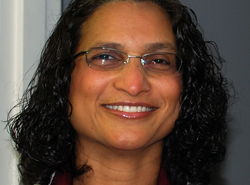Hoyt Brewster didn’t notice he was losing his peripheral vision.
 |
Sushma Rai, M.D. |
Like many with Glaucoma, he didn’t even realize he had it. It’s a story UNMC ophthalmologist Sushma Rai, M.D., has heard too many times.
“I see patients with advanced glaucoma. If they had been screened sooner, we could have slowed down the progression of their disease,” said Dr. Rai, an assistant professor in the department of ophthalmology and visual sciences. “We can prevent blindness through medication, laser procedure or surgery.”
Glaucoma, known as the “silent blinding disease” is the second leading cause of blindness in developed countries, and can be slowed. Most glaucoma patients do not know they have the condition because symptoms only show late in the disease progress, when a significant part of the vision has been irretrievably lost.
It is predicted that by the year 2020, 80 million people worldwide will have glaucoma, and 11 million of them will be blind in both eyes.
|
Though his vision is OK, Brewster’s peripheral vision is hampered and he has to make sure he turns his head to the left or right to see things on the periphery.
During screening, physicians check eye pressure and dilate the pupils to examine the optic nerve. Health insurance may pay for some screenings. Check with your health insurance provider.